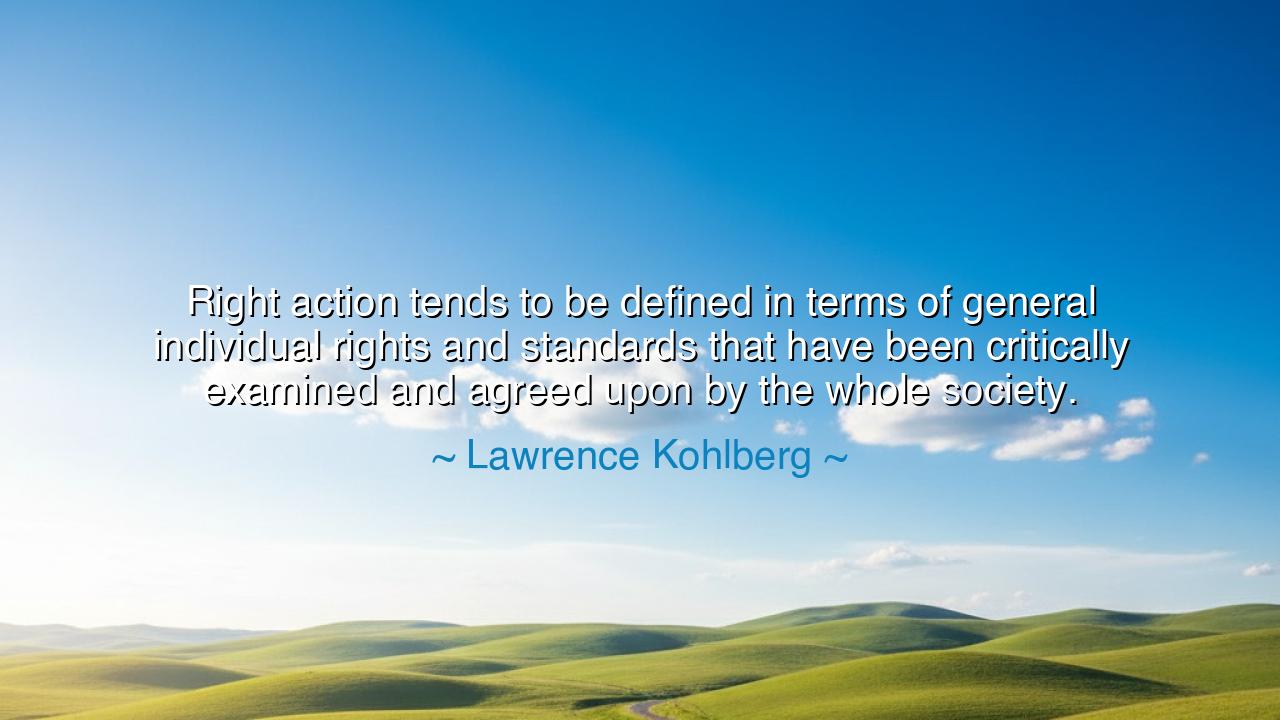
Right action tends to be defined in terms of general individual
Right action tends to be defined in terms of general individual rights and standards that have been critically examined and agreed upon by the whole society.






Hear now the teaching of Lawrence Kohlberg, who spoke with the voice of moral clarity: “Right action tends to be defined in terms of general individual rights and standards that have been critically examined and agreed upon by the whole society.” In these words lies a map for justice, showing us that true morality is not the whim of the powerful, nor the custom of the many, but the covenant of a people who have wrestled with truth, reason, and conscience. The ancients called this logos—the guiding light of reason that lifts humanity above impulse and chaos.
To act rightly is not merely to obey; it is to stand upon principles that have been critically examined, tested by thought, trial, and dialogue. The tyrant may proclaim laws, the mob may demand obedience, but unless a society pauses to weigh these demands against the dignity of the individual, they are but chains, not standards. Kohlberg’s wisdom reminds us that true civilization is born not when one man dictates, but when all voices, even the frailest, are heard in the forging of justice.
History offers us the noble story of the Magna Carta, sealed at Runnymede in the year 1215. The king of England, once wielding absolute authority, was forced by his barons and people to recognize certain rights: that justice must be granted, that the law must restrain even the sovereign, and that the voice of the governed mattered. Though imperfect and limited, this agreement planted the seed that right action is bound not to power alone, but to the standards agreed upon by society. From that seed grew the principles of liberty that spread across nations, shaping the future of human rights.
But let us not be deceived: agreements made without honest scrutiny are fragile. Customs can enshrine injustice, and traditions can disguise cruelty. It was once “agreed upon” that slavery was lawful, that women were voiceless, that the poor were disposable. These were not right actions, for they were never tested against the eternal measure of human dignity. Kohlberg calls us to critical examination—to question even the practices that seem immovable, and to ask always: Does this honor the rights of every soul? Does this uplift the weakest, or does it trample them beneath the feet of the strong?
The strength of a society lies not in its armies nor its wealth, but in its shared standards of justice. Where these standards are formed through wisdom, compassion, and debate, there the people walk in freedom. Where they are dictated by fear or blind tradition, corruption festers, and liberty withers. Thus, the burden falls upon each generation to renew the covenant, to weigh anew the meaning of right action, and to align it with the eternal truth that every person carries within them a spark of divine worth.
The lesson for us is clear: do not live as passive heirs of rules, but as guardians of principles. Take part in the great dialogue of your time—listen, question, and weigh every standard against the dignity of life. When you encounter injustice cloaked as custom, have the courage to speak. When society drifts toward apathy, be among those who awaken it to higher ideals. For society’s standards are not forged by kings or councils alone, but by the voices of countless individuals who choose to act with conscience.
Therefore, beloved listener, take this wisdom into your own life. In your family, your community, your nation, ask not only, “What is customary?” but also, “What is right?” Uphold the rights of others as fiercely as you guard your own. Build with others the standards that will guide future generations. For in doing so, you will stand in the noble company of those who, across history, lifted humanity from darkness to light.
And so, remember Kohlberg’s words as a guiding star: “Right action tends to be defined in terms of general individual rights and standards that have been critically examined and agreed upon by the whole society.” Let these words remind you that justice is not given, but forged; not declared, but discovered. Carry them into your speech, your deeds, and your heart, and you will walk the ancient path of wisdom that leads from bondage into freedom.






AAdministratorAdministrator
Welcome, honored guests. Please leave a comment, we will respond soon